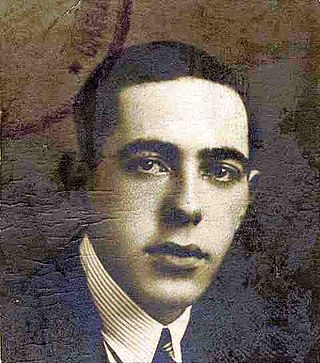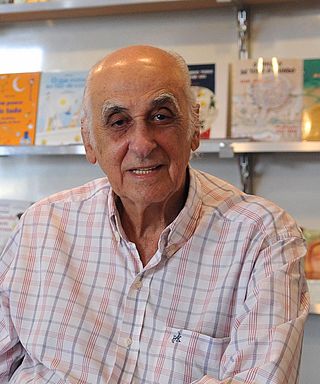
Otto Maria Carpeaux, born Otto Karpfen, was an Austrian-born Brazilian literary critic and multilingual scholar.

Maurício Waldman is a Brazilian academic and environmental activist.

Zuenir Carlos Ventura is a Brazilian journalist and writer. He is a columnist for the newspaper O Globo, and for Época magazine. He won the Jabuti Prize in 1995 in the "reportage" category for the book Cidade Partida. In 2009, his book 1968 - O que Fizemos de Nós won the third place at the same category of the prize. In 1989, he and his team of journalists from Jornal do Brasil won the Esso Journalism Award for their reportage on Chico Mendes' murder investigation.

Luis Carlos Verzoni Nejar, better known as Carlos Nejar, is a Brazilian poet, author, translator and critic, and a member of the Academia Brasileira de Letras. One of the most important poets of its generation, Nejar, also called "o poeta do pampa brasileiro", is distinguished for his use of an extensive vocabulary, alliteration, and pandeism. His first book, Sélesis, was published in 1960.
Marcelo Lopes de Souza is a professor of socio-spatial development and political ecology at the Department of Geography of the Federal University of Rio de Janeiro, where he co-ordinates the Núcleo de Pesquisas sobre Desenvolvimento Sócio-Espacial/NuPeD. He received the first prize of the German Society of Research on Latin America in 1994 for his PhD thesis about the urban question in Brazil, and the Jabuti Award for his book O desafio metropolitano in 2001. His book Fobópole: O medo generalizado e a militarização da questão urbana, published in 2008, was nominated for the Jabuti Award in 2009.

Tatiana Salem Levy is a Brazilian writer and translator.

The São Paulo Prize for Literature is a Brazilian literary prize for novels written in the Portuguese language and published in Brazil. It was established in 2008 by the Secretary of Culture for the State of São Paulo. Though not as old as other literary prizes in Brazil, such as the Machado de Assis Prize, the São Paulo Prize has quickly risen in prestige. For example, in 2011, there were 221 submissions for the prize. This rapid rise in popularity is partly because of the large cash prize. Every year two prizes of R$200,000 each are awarded—one for the best novel of the year by an established author, and the other for the best novel of the year by a debut author—making the São Paulo Prize the largest prize for a published work in Brazil, and one of the largest literary prizes in the world. Ten finalists are listed for each award, during the Festival da Mantiqueira, and the winners are announced on the first Monday of August in the Museum of the Portuguese Language.

Benjamin Abdala Júnior is a Brazilian writer, scholar, and literary critic. His first book, A Escrita Neo-Realista, was published in 1981. He published the book Antologia da Poesia Brasileira - Realismo/Parnasianismo in 1985. He has written over 40 published books and hundreds of chapters in book collection,articles in newspapers and literary magazines .He has worked with the main Brazilian Scientific Agencies evaluating scholarships and grants requested by researchers from the main Brazilian universities. Benjamin has also lived in Portugal and France, where he expanded his research and gave lectures on Comparative, Portuguese and African Literatures. He has been invited to the main universities in Africa, China, United States, Canada, France, England, Portugal, Austria, Tchecoslovaquia, Russia and Chile, giving lectures on African Literatures of Portuguese Speaking Countries, Comparative Literature, Neo-realism in Portugal and Brazil, among other subjects. Grandson of Lebanese immigrants, he received a Merit Medal celebrating 130 years of Middle Eastern Immigration to South America from BibliASPA - Biblioteca e Centro de Pesquisa América do Sul - Países Árabes. He has 3 children and 3 grandchildren, and lives in São Paulo. He is retired from University of São Paulo after 35 years of contribution as professor and administrator, but he is still actively involved in the Faculdade de Filosofia, Letras and Ciencias Humanas as a researcher.

Laurentino Gomes is a Brazilian journalist and writer. He is best known as the author of the trilogy of books that cover the history of Brazil and Portugal during the 19th century. He has already released two of the three books: 1808, about the transfer of the Portuguese Court to Brazil; and 1822, about the Independence of Brazil. He is about to release the third and final book of the series, 1889, about the Proclamation of the Republic.

Daniel Munduruku is a Brazilian writer and educator. He is member of the Munduruku indigenous people. His children's books deal about traditional indigenous life and tales and have been awarded several prizes. Munduruku holds three undergraduate degrees in philosophy, History and Psychology. He has a master's degree in Social Anthropology and a doctorate in education by the University of São Paulo.

Carlos Leôncio (Nhonhô) de Magalhães was a Brazilian farmer and businessman. Nhonhô is considered to be one of the "coffee kings" and was one of the richest Brazilian farmers of the early 20th century. Carlos Leôncio de Magalhães started to work as a farmer during his early life and his name is connected to some of the most important farms of the Western part of the state of São Paulo, among which are Cambuí, Barreiro Rico and Itaquerê. Later on, these farms developed into towns, such as Matão, Nova Europa, Santa Ernestina, Gavião Peixoto and Tabatinga.

Boris Fausto was a Brazilian historian, political scientist and writer.

Pedro Bandeira de Luna Filho is a Brazilian award-winning and best-selling children's novelist and poet, best known as the author of the Os Karas hexalogy of mystery novels which comprise A Droga da Obediência (1984), Pântano de Sangue (1987), Anjo da Morte (1988), A Droga do Amor (1994), Droga de Americana! (2001) and A Droga da Amizade (2014).

João Carlos Reiners Terron, writing as Joca Reiners Terron, is a Brazilian poet, novelist, designer and editor.

Lilia Katri Moritz Schwarcz is a Brazilian historian and anthropologist. She is a doctor in social anthropology at the University of São Paulo, full professor at the Faculdade de Filosofia, Letras e Ciências Humanas in the same institution, and visiting professor at Princeton University.
Paulo Scott is a Brazilian author, poet, playwright, screenwriter and translator.

Mário Xavier de Andrade Pedrosa was a Brazilian art and literary critic, journalist and political activist.
Gerardo Majella Mello Mourão was a Brazilian poet, fictionist, politician, journalist, translator, essayist and biographer, considered a key figure in both the national and all Lusophone literature. Mourão joined the Brazilian Integralist Action in the late 1930s. In 1942, he was convicted of spying for Nazi Germany and sentenced to life imprisonment, later reduced to 30 years. He was released from prison in 1948.
João Camilo de Oliveira Torres was a Brazilian writer, professor, historian and journalist.















